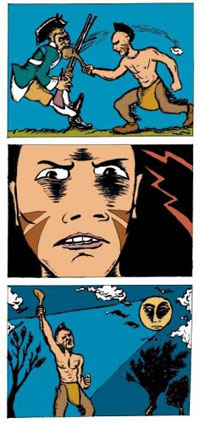Here’s the fifteenth installment of LiteratEye, a series found only on The Art of the Prank Blog, by W.J. Elvin III, editor and publisher of FIONA: Mysteries & Curiosities of Literary Fraud & Folly and the LitFraud blog.
LiteratEye #15: Wu Ming Re-Visions American History
By W.J. Elvin III
May 22, 2009
 So you’ve got this American Revolution-era historical novel weighted toward the Iroquois point of view, written by four anonymous Italian guys who call themselves Wu Ming. Formula for a best-seller or what?
So you’ve got this American Revolution-era historical novel weighted toward the Iroquois point of view, written by four anonymous Italian guys who call themselves Wu Ming. Formula for a best-seller or what?
Let’s start with “or what?”
The English language version of Manituana isn’t out yet, though you can get in line for it at Amazon. So, not reading Italian, I can’t say if it really has the best-seller qualities mentioned by those who have read it. It may well be a page-turner of the Dan Brown sort, with the welcome added element of intellectual stimulation, as has been suggested.
Wu Ming has had previous successes under that name and other hits writing as Luther Blissett.
ArtofthePrank readers may recall Blissett as a collective counter-cultural commotion of the 1990s wherein artists, pranksters, protestors, writers and others identified themselves as Blissett.
Luther Blissett, a soccer player from Jamaica, was victim of racial slurs while playing for an Italian team. At first he wasn’t pleased with the craze surrounding his name, but eventually he got into the spirit of it. Some excerpts from his appearance on a BBC program can be found on a rather poor quality but definitely bizarre YouTube clip:
Apparently Blissett, the movement not the man, was initially involved in hoaxes calling attention to media malfeasance. For instance, there was the group “Comitato di Salvaguardia della Morale” or Committee for the Defense of Morality, established in Bologna in 1996 to combat what it identified as satanic youth activities.
At the time there was a witch-hunt going on, fueled by the media, with authorities cracking down on alleged young Satanists. The Committee fed the media a lot of hokum about crazy demonic happenings; the media published the concoctions without verification. The hoax was then exposed and the witch-hunt successfully countered.
These various stunts got the four activists and their co-conspirators labeled in the Italian press in terms not difficult to decipher: “terrorista culturale”, “bandito dell’informazione,” “pirata informatico,” “guerrigliero digitale” … among others.
From there, “Blissett” turned to writing best-sellers including “Q,” and then, poof, Blissett committed virtual seppuku or ritual suicide en masse.
The four activists at the center of it all subsequently re-emerged as Wu Ming, that being Mandarin Chinese for anonymous, so they say. This may all be true, or not, but it is only a glimpse of the Blissett and Wu Ming processes, to which must be added a lot of philosophical or political explanations. All that is best left to the group’s web site and links.
Wu Ming has been termed “collectivist anarchists,” but they deny the anarchist part, though not for lack of regard.
And what, exactly, is Wu Ming’s function? Lately, they say, “we have collaborated with musicians, actors, comic authors, playwrights, filmmakers, graphic artists and academics in a plethora of projects.”
But back to the latest book. According to information provided by the authors, Manituana blends fact and fiction in a story that centers around a New World family of mixed British and Native American descent. “The Johnson-Brandt clan lives in a world that is familiar but not immediately of its time: hunter-gathering and Indian cosmology are part of a way of life that also includes violin-playing and living in stone houses rather than teepees.”
There is an interactive site within the group’s web presence where anyone can join in continuing the story or just commune with others who have read it. But to enter you must have read the book. That is ascertained by your answer to the question: “Who is the first spectre appearing to Philip Lacroix after the Battle of Oriskany?”
“Manituana isn’t only a book, we projected it as a world, an example of participatory/transmedia storytelling. In fact, many people have contributed to the project by writing short stories and poems, composing soundtracks, making videos, turning passing references to this or that character in new sub-plotlines branching off the novel onto different media platforms (e.g. comics, war table games, radiodramas etc.)
This stuff is on the book’s official website, which is very rich in its Italian and Spanish sections, but not yet in the English one.”
They say Manituana is the first installment of a planned tryptich on the relationships between Europe and America. “We usually call it ‘il Trittico Atlantico.’ We’re not in a hurry, we’ll work on the next two books with the slowness and care they deserve.”
So, if Manituana takes off like Da Vinci Code and rakes in the big bucks, who profits? I had a number of questions for Wu Ming. In response, they very kindly sent me these words from Eduardo Galeano:
“L’utopia sta all’orizzonte. Mi avvicino di due passi, lei si allontana di due passi. Faccio dieci passi e l’orizzonte si allontana di dieci passi. Per quanto cammini, non la raggiungerಠmai. A cosa serve l’utopia? A questo: serve a camminare.”
Thanks, guys, and, of course, good luck with Manituana.
illustration: manituana.com
(Copyright 2009 WJE, exclusive to The Art of the Prank, for reprint rights contact Literateye@gmail.com)
Related posts:
